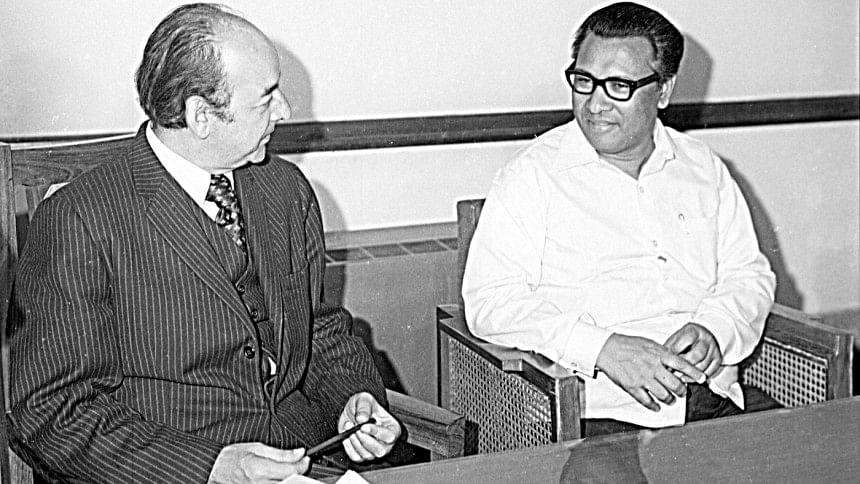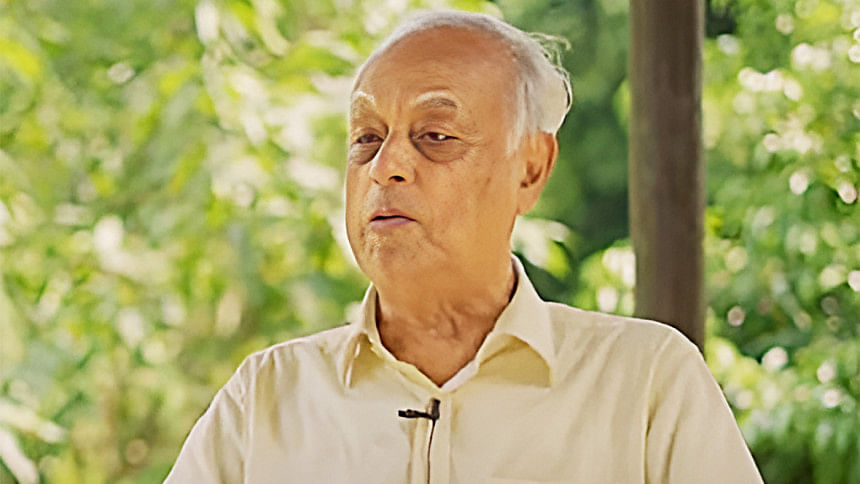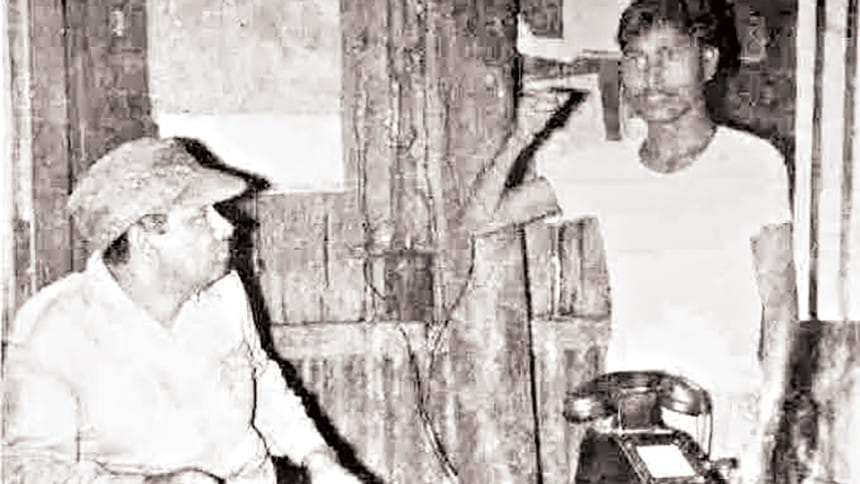‘Tajuddin was objective, fact-based — quite unlike many other Awami League leaders’

The Daily Star (TDS): How and when did you first come into contact with Tajuddin Ahmad?
Muyeedul Hasan (MH): I first met Tajuddin Ahmad in 1961, when I was working for The Daily Ittefaq and had been writing editorials for about a year. One of my colleagues — a woman who oversaw the women's page — once asked if I had ever spoken with Tajuddin Ahmad, noting that he was somewhat different from most political leaders. Curious, I decided to meet him. So, we went to his house on Karkun Bari Lane. His room was simple, with just two chairs. I noticed that he read all the newspapers thoroughly. He began the conversation by discussing my writings.

What struck me as different about Tajuddin was that he rarely commented on individuals. Instead, he was deeply interested in writing — what was being published, who wrote what, and how good a particular piece was. That was something quite unique about him.
Also, I had the rare opportunity to spend an extended period with Tajuddin Ahmad — from February 1962 until mid-June. We were imprisoned together in Dhaka Central Jail during that time.
This was when Ayub Khan announced his second constitution. In response, the student community began mobilising for protests. The government anticipated unrest by the Awami League and arrested many of its members. Some leaders from the Communist Party, including Ranesh Dasgupta and others, were also detained. We were kept separately, near Urdu Road.
In that section were Tajuddin Ahmad, Manik Miah, Sheikh Mujibur Rahman, Abul Mansur Ahmad, Kafiluddin Chowdhury, and Korban Ali — all prominent Awami League figures. I was arrested too, even though I was only an assistant editor at The Daily Ittefaq at the time. It seemed that my association with the paper — as the youngest member of the editorial section — was enough for the authorities to assume I was an Awami Leaguer.
The then Chief Justice of Pakistan, Muhammad Shahabuddin, had led a commission to review the proposed constitution. A series of editorials about that was published in The Morning News over 11 or 12 days.
There were 24 of us imprisoned together, and soon there was a scramble over who would get to read the newspaper — pages would tear in the chaos. So, from the second day, a system was established: Abul Mansur Ahmad and Manik Miah decided that only two people would read and summarise the constitutional reports. They would then brief the rest of us, along with their critical observations.
Tajuddin and I were part of that small reading group. He was about ten years older than me and a much more accomplished scholar. While working together in jail with Tajuddin Ahmad, I noticed that our reasoning often aligned. He was objective, fact-based — quite unlike many other Awami League leaders.
For four and a half months in prison, we worked together each morning, reading reports, underlining key points, and preparing materials for presentation to the group. Through that process, an intellectual bond formed between us.
After our release, we saw each other occasionally — perhaps once every month or two — usually when he visited the Ittefaq office.
From the beginning, I used to write about the economy in Ittefaq, and I realised that we were victims of disparity in many ways. Perhaps I was doing that work quite well. However, I left journalism and the Communist Party at the end of 1966. I saw that the Party leadership was fixated mainly on the Moscow and Peking affairs, with nothing about our local issues. So, I left the Party and got involved in a bit of business. Then the anti-Ayub movement began, Ayub fell, and Yahya came. I suddenly went to Bogura, where people already recognised me from my newspaper writings and my past involvement with the Student Union. As soon as I arrived, the members of East Pakistan Student Union started reaching out to me. They said I had to contest, and I stood in the election for NAP in 1970.
At that time, some of my writings were published—about the Six-Point demands—where I explained how these demands could be achieved, given that there was no scope for their implementation within the framework of a united Pakistan. These articles appeared in Forum magazine. The logic was simple: people would vote in favour of the Six-Point demands, and the Awami League would win. However, I raised a critical question: how would these demands ever be implemented, given that Pakistan's power structure—its army, bureaucracy, and business elites—would never accept them? Then would the Awami League really fight the army for it? No—except for a few leftists and some individuals, no one would. So, if we truly wanted autonomy for Bengal, it was essential to contest the election jointly with the left and allied groups. This perspective went against the official stance of the Awami League. Shortly afterwards, Sheikh Mujib reached out to me through Tajuddin. My concerns had been discussed in the Awami League's central committee, and Sheikh Mujib intended to offer me a party ticket to contest the election and join the party's planning team. He believed this would address my criticisms.
TDS: What sequence of events led to the March 1971 crackdown, and how did the resistance movement emerge in response?
MH: In March 1971, Masih-ud-Daulah, the elder brother of Asaf-ud-Daulah—the former Secretary—was serving in the Pakistan Army as General Staff at the Corps Commander's Office in Dhaka. As G-2 of the Corps Commander, he was responsible for Intelligence and held the rank of Major at the time. Another of his brothers was Anis-ud-Daulah. One of Masih-ud-Daulah's close friends, Anwarul Alam, was also a friend of mine.
Anwarul Alam met me on March 3. He said that an informant had asked him to pass on critical information to the higher political leadership. Preparations for a Pakistani military operation were already at an advanced stage. A tank convoy had been transported from Rangpur to Dhaka, where the tanks were being fitted with rubber belts—making them suitable for movement and combat on the roads leading into Dhaka city. Alam urged me to share this intelligence with the appropriate political circles.
I trusted Alam—not only because of our long-standing friendship and shared political beliefs, but also because I respected his honesty and political judgement. I agreed to relay the message. However, I added that while this information might reach us through other channels, he should ask his source whether there was any possible way to prevent the imminent attack.
Over the next two days, Alam was extremely busy but took considerable risks to reach out to the other side at least twice. He also remained in close contact with me. On the evening of March 5, I finally received a complete response to my question. He told me that the only way to prevent the Pakistani military assault was through a counter-military operation. At that time, Bengali soldiers in the province still outnumbered non-Bengali troops. With their support, it would be possible to simultaneously destroy the Godnail fuel depot, disable the Dhaka airport, and seize the Chittagong seaport. Executing these three operations together would severely cripple the Pakistani military's capabilities.

Thus, it was clear that the number of Bengali soldiers was sufficient to resist the impending attack — but it wouldn't happen automatically. Orders had to be given. And of course, those orders would have to come from the elected leadership — someone who had gained legitimacy through the election. So, I met Sheikh Mujibur Rahman, and he told me to discuss the matter with Tajuddin Ahmad.
After hearing everything, Tajuddin asked me, "Why did Mujib send you to me?" I replied, "Perhaps you'll ask a lot of small, detailed questions and then report back to him. Or maybe he just doesn't want to be involved in this at all and is avoiding me." Tajuddin responded, "It seems your second assumption is correct."
TDS: How did you become involved with Tajuddin during the war?
MH: At that time, a Punjabi man named Jafar Naqvi lived next to my house. He had served as the Chief Reporter of The Pakistan Times between 1962 and 1964. We became very close friends. Both of us belonged to the same faction of the Communist Party — the one entangled in the Moscow–China ideological conflict. Like me, he was disillusioned with both sides, though he leaned more towards the pro-Moscow position. I was around 35 years old then, while he was over 40. By that time, he had left journalism and was serving as the resident director of Eastern Refinery Ltd in Chittagong. He frequently travelled between Chittagong and Karachi, as his maternal uncle was the head of the organisation. Every week, he was required to report to Tikka Khan two to three times regarding Petroleum, Oil, and Lubricants — detailing available stock, goods in transit, and quantities being refined.
He would occasionally drop by and share updates. One day, he suddenly asked, "So, you're still around?" I replied, "Yes, everything seems normal now." He responded, "What normal? Another major crisis is imminent. It's going to happen soon."
He warned, "The Indians are training so many people — do you think Pakistan will just sit idle? They will strike. And once the attack happens, the war will begin."
He advised me to leave, saying, "War is about to begin again." When I asked why, he explained that the Pakistani army was delaying because the Chinese hadn't fully given their nod yet. Pakistan, he said, would find it difficult to go to war alone without clear support from China.
Within our group, we quietly gathered information. Shahidullah Kaiser, my mentor in the Communist Party, was a small-built, cheerful man of about 45. We met almost daily in Dhanmondi, where he, Ahmadul Kabir, and Zohur Hossain Chowdhury would often exchange news.
It was Shahidullah Kaiser who first told me that Tajuddin Ahmad was either in Kolkata or Delhi, and that I should go and find him — someone reliable was needed to brief them on the situation in Dhaka. So, in May, I went to Calcutta. I didn't find Tajuddin right away, but I met Amirul Islam and Nurul Quader first.
Tajuddin Ahmad first shared with me his belief that Mrs Gandhi was a sincere leader who would stand by Bangladesh's cause. In response, I raised a concern — though she may have assured full support, there remained a possibility that if China were to intervene or launch an attack, she might frame it as an external conflict and withdraw her support, leaving us to face the situation alone. This concern stemmed from insights I had received earlier from Jafar Naqvi.
Tajuddin acknowledged the risk but noted that such developments were beyond what they could have anticipated at the time.
I then argued that India's security could only be ensured through a firm assurance from the Soviet Union — specifically, that the Soviets would deter any potential Chinese aggression. I reminded him that China still had around one lakh soldiers deployed along the Ussuri River, and there was fighting between these two countries along the border. If China were to intervene and the Soviet Union formed a formal alliance with India, it could dissuade Chinese action. Only under such an arrangement, I asserted, could India feel genuinely secure. At that point, we had no other support on the global stage.
Tajuddin remained silent for a while and then suggested that I go to Delhi to raise these strategic concerns with Indian policymakers. Following his advice, I went to Delhi to engage with Indian policy-level think tanks.
The rest of my account of working with Tajuddin Ahmad during the Liberation War is documented in detail in my book Muldhara '71.
The interview was taken by Priyam Paul.

 For all latest news, follow The Daily Star's Google News channel.
For all latest news, follow The Daily Star's Google News channel. 



Comments